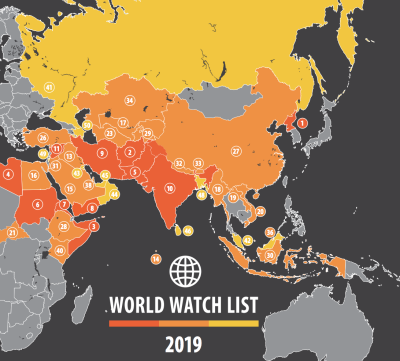Alarm bells against discrimination

Fortunately, the media are increasingly reporting about persecution of people on account of their religion. This no longer happens only on particularly news-worthy occasions.
For example, if a dozen Christians die in Egypt in an attack on a bus on its way to a desert monastery, or if a symbolic person, like Asia Bibi in Pakistan, is sentenced to death for alleged blasphemy, or if hundreds of thousands of Muslim Rohingya are driven out of Myanmar. In the past, it often required a statement by public figures. First, politicians or bishops had to comment, to give enough weight to the matter.
Nevertheless, until today most incidents do not make it into the mass media. There are just so many of them. Many of them occur in remote corners of the earth hardly anyone elsewhere is really interested. Therefore the publication of documentations on persecution and discrimination against Christians is important as they inform in a systematic way. At the same time they raise attention and give occasion for additional media events on the matter. One example is the bi-annual Religious Freedom Report of Aid to the Church in Need, which highlights improvements and deteriorations. Another example, that is only available in German, are the yearbooks on religious freedom and on discrimination and persecution of Christians, which amalgamate some of the most important information and articles of each year.
However, some people do not put much value to country comparisons, and frown even more on any rankings. Some overlook the fact that comparisons and rankings usually only represent the tip of the iceberg of a much richer information offer. Therefore, this contribution aims to present the different types of global surveys and comparisons of the level of religious freedom or persecution of Christians in different countries and to argue for their usefulness.
Databases
Databases arranged by country, including newscasts on individual incidents, analyses, comments and events, provide a preliminary stage to systematizing world surveys. News casts are generated by several specialized news services, such as WorldWatch Monitor and Morning Star News, and by Christian news services and magazines. Additionally, countless individual reports are produced by relevant Christian organizations and networks focusing on the topic, some of which are displayed on portals such as One We Stand.
Large databases of such news are provided by several research institutions. The International Institute for Religious Freedom archives the collection of media reports on religious freedom collated daily as a digest by the US Commission on International Religious Freedom. This is searchable by countries, religions, victims and perpetrators. Human Rights without Frontiers provides a database of static annual country-by-country compilations on freedom for religion and belief, derived from a variety of sources. The International Center for Law and Religion Studies of the Brigham Young University Law School offers law and religion headlines on an international, European and US level.
However, with all these offerings it is up to the user to combine the random news items, reports and analyses into an overall picture of the situation of any given country, provided that the information is sufficient and the necessary background knowledge available. Therefore, beyond all this, systematic, analytical and interpretative approaches are necessary to facilitate a comparison of countries or global overviews.
Global Surveys
Some of these global surveys inform about the persecution and discrimination of Christians country by country or region by region. Others concentrate on different particular topics like the fate of prisoners of conscience, or add such additional topics to their country surveys. A few of the surveys also attempt to compare between the different countries and to score them. One such example is the report of the Pew Research Center (Washington, DC) on restrictions of religious freedom by governments and social hostilities based on religion. The result is displayed on a matrix, dividing the countries into different groups.
Only few institutions or groups have sufficient staff and resources to cover the majority of the world's countries in their reports and to do so annually and in detail. The State Department of the United States of America is currently taking the lead with its annual "International Religious Freedom Report". However, a rudimentary rating of countries only occurs after publication, and it is a political exercise. The US government then declares a few countries to be "countries of particular concern". However, the procedure is mitigated by foreign policy considerations and usually has more of a symbolic effect.
Other reports focus only on a selection of countries of particular concern, such as the annual report of the US Commission on International Religious Freedom, which applies a rudimentary classification.
Country Rankings
Then there are country rankings such as the Freedom of Thought Report of the International Humanist and Ethical Union or the World Watch List on persecution of Christians issued by the charity Open Doors. The latter excels in being up to date, as it appears already 10 weeks after the completion of the time frame under examination. It has an exceptional proximity to the Christian grassroots in the countries most intensely affected, particularly among evangelical and Pentecostal churches. In addition it demonstrates a special sensitivity for the fate of converts, who – as might be known – are more frequently intensely persecuted than most other Christians.
Read more from "Alarm bells against discrimination" on The Christian Post.